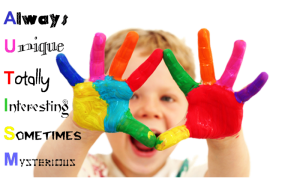By Yitong Li
When it comes to autism, many people tend to picture a somewhat non-responsive kid absorbed in arranging puzzles in a particular way. However, autism is far more than that. Autism or Autism Spectrum Disorder (ASD) is the name assigned to a group of complex disorders that affect brain development. Some common symptoms are repetitive behaviors, fixation, unresponsiveness, withdrawal from social interactions, etc. More severe cases even lead to difficulties in communication and emotional disturbance. On the other hand, there are also cases where people with ASD become incredibly successful in art, music and science.
So what exactly is autism, and what causes such a wide range of disorders that, while making some people’s life extremely challenging, propels other people’s talent?
To begin with, ASD is a heterogeneous disease, meaning that each individual develops their own particular symptoms or carries the disease to a different degree. That’s why ASD is diagnosed and treated based on a spectrum. As of 2013, there are four different levels on the diagnostic spectrum (see below), with autism being the most severe one:
- Autism
- Asperger’s Syndrome (a milder form of autism)
- Pervasive Developmental Disorder-Not Otherwise Specified (atypical autism)
- Childhood Disintegrative Disorder
People with ASD on the milder end of the spectrum may be fully functional with a few exceptional characteristics. Usually able to take care of themselves like anyone else, they have fewer problems dressing themselves or communicating with others. In contrast, people on the severe end of the spectrum may not be able to interact with society and thus desperately need to be looked after 24/7. Most of the time, these kids need to go to special schools and receive one-on-one education. Their condition may become better if they start to receive behavioral intervention at an early age. Nevertheless, because of the heterogeneity of ASD, successful treatment is not guaranteed.

Picture from Prince William County Public Schools
Since the disorder is so heterogeneous, nobody has yet identified a single, common cause for ASD. While for some, a novel genetic mutation is more likely to be the main cause of the disorder, for others, environmental stimulus during pregnancy is more likely to be blamed. Pregnancy at older age, exposure to plastics and pollution, familial history and a lot of other factors have all been suggested to play some role in the development of these disorders. The multifactorial nature of ASD makes it almost impossible to pinpoint the sole culprit, let alone preventive diagnosis and treatment.
Frustrating as it may sound, ASD also has a flip side. Autistic kids turn out to be more focused on their tasks and also more imaginative. Doubtless, staying focused and being imaginative are among the key factors that nourish the seeds of success. These children tend to perceive the world differently than their peers, making them peculiar in their social groups, but also prodigies in art and music. Despite their limited verbal communication, kids on the spectrum express themselves through other channels. Not allowing herself to be limited by her autism, the British girl Rosie sets her imagination free and draws wonderful illustrations for books. In addition, the fixation of autistic kids in organizing stuff and searching for underlying patterns tends to train their brains to be more logical and better at math. Such strong and narrow passion usually observed in autistic children has generated prodigies in advanced math and physics and people with exceptional memory. If you type “famous people with autism” in Google, you would be surprised to find how many renowned artists, musicians, and scientists are suspected to be on the spectrum. The proposed link between autism and genius has become so strong that neuroscientists even dived in to find scientific evidence for such phenomenon. There is no doubt that the parents of these exceptional prodigies, as well as the community they grew up in, gave them a lot of love and patience to help these “outsiders” discover and develop their talents. However, it is more important that society as a whole embraces their differences and give them the chance to shine.
For me, autism is less of a behavioral disorder than a different personality. No human being is perfect, as each one of us is flawed in one aspect or another. While our current technology and treatments may be limited at improving the condition of some people on the severe end of the spectrum, our minds should be limitless in accepting and respecting their differences. After all, individuals with ASD are human beings who are just born with a different skill set and approach the world differently. They can be equally, if not more, talented, intelligent, and successful than their peers who don’t have such mental disorder. Therefore, I read autism as: Always Unique, Totally Interesting, and Sometimes Mysterious!
Acknowledgement and useful links:
I learned a lot about autism from Autism Speaks, Interactive Autism Network, and Dr. Martin Styner from the Department of Psychiatry and the Department of Computer Science at UNC Chapel Hill.
Edited by Mike Pablo and Sarah Marks
